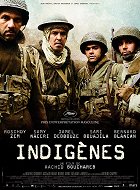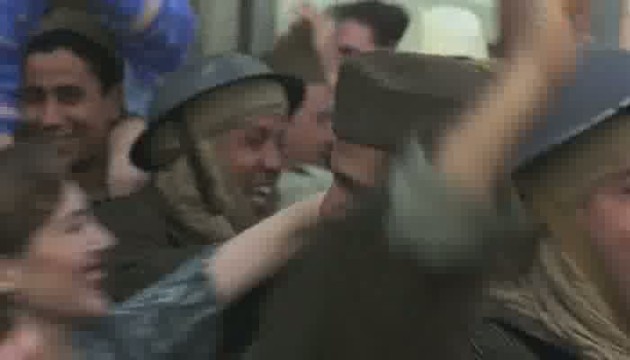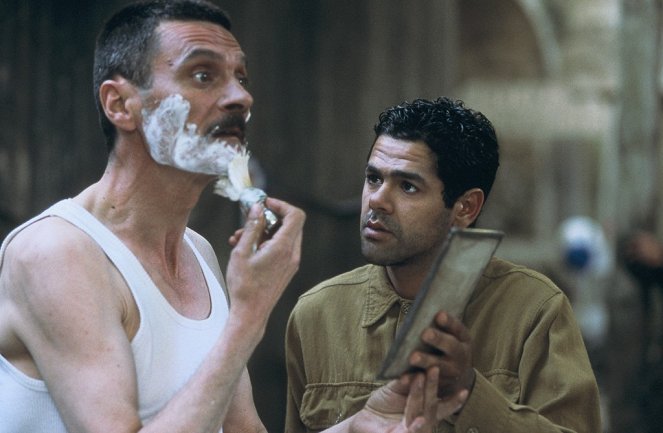Regie:
Rachid BoucharebKamera:
Patrick BlossierBesetzung:
Jamel Debbouze, Samy Naceri, Roschdy Zem, Sami Bouajila, Bernard Blancan, Assaad Bouab, Mélanie Laurent, Aurélie Eltvedt, Mohamed Majd (mehr)Inhalte(1)
1943. Um im Kampf gegen die deutschen Besatzer zu bestehen, stellt General De Gaulles ein riesiges französisches Exilheer auf. 233.000 Kolonial-Afrikaner werden mobilisiert. Sie riskieren ihr Leben für ein Land, das sie nie gesehen haben. Angeführt von Sergent Martinez marschieren die Algerier Said, Yassir, Abdelkader und Messaoud nach Italien, wo sie in der verlustreichen Schlacht von Monte Cassino ihre Feuerprobe bestehen müssen. Im Rahmen der Operation Dragoon landen sie anschließend in Südfrankreich und befreien Marseille. Doch die französischen Ideale von Gleichheit und Brüderlichkeit gelten für die Nordafrikaner nicht. Immer wieder erfahren sie Diskriminierung und Rassismus aus den eigenen Reihen. Als Speerspitze im Kampf um das Reich kommt es für sie im Elsass zum finalen Gefecht mit der Wehrmacht. (Verleiher-Text)
(mehr)Videos (1)
Kritiken (2)
Politically correct and, from a historical perspective, a fairly balanced film. The original inhabitants of North African colonies go with the French army to liberate "their" homeland, which most of them have never even visited - although the filmmakers, even though they clearly focused mainly on describing the courage and patriotic awareness of the Muslims, didn't forget to touch on at least the marginal aspects of the involvement of "Moroccans", etc. on the European fronts, i.e., thefts, rapes. The combat scenes are also in no way offensive. It is ironic that those who had hoped for freedom and equality through cooperation with the French during the World War had to fight for their own definitive freedom in the 1950s and 1960s in wars against them.
()
The units of free France were mostly composed of indigenous men from French colonies, where the influence of the Vichy government did not reach. This fundamental truth was rarely seen in French historical consciousness or in the artistic sphere, especially after the bitter experience of the Algerian War. However, France had a debt not only to war veterans from World War II but certainly one even greater to Arab loyalists known as harkis, who supported France during the Algerian conflict and faced the worst after France's defeat. Even those who received asylum in France were second-class citizens. During World War II, the French administration certainly did not treat its soldiers equally. Even worse conditions were present in the American army, where there was harsh racial segregation, which was only not applied in the American Navy. So it is not surprising that when a film with a similar theme was created many decades later, it became a social event widely commented on by most media, with members of parliament and political leaders participating in the film premiere. France has a completely different birth rate dynamic nowadays, and the ethnic composition is rapidly changing in favor of the Arab element. For the same social reasons, the film was soon nominated for an Oscar, because considering the quality of the film, there could be nothing else behind it. The screenplay is quite average, just like the direction, and the film was created to address the issue of racism in a somewhat didactic manner, rather than truly entertaining the audience. The action is slow-paced and at times one cannot help but feel bored. Perhaps the most interesting aspect is the presence of Jamel Debbouze, a popular actor and presenter, who suffered a serious accident in childhood and lost his hand. Notice that in a significant role, he never takes his hand out of his pocket and only fights with a pistol. This is not apparent in any other film, but here, given the genre, it is quite obvious. Overall impression: 45%.
()



Werbung